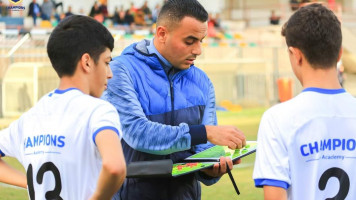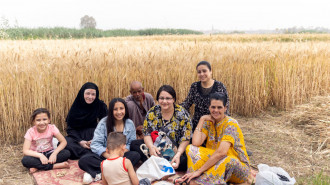Landslide damage has Gazans pointing finger at 'Egypt pipeline'
Although no one has ever seen it, locals around Rafah city - on Gaza's border with Egypt - claim the culprit of this landscape destruction is a one-metre wide underground pipeline set up by Cairo to pump seawater deep into the frontier earth.
Cairo has never confirmed the pipe's existence, but Palestinians are adamant it is being used to deliberately flood smuggling tunnels between Gaza and Egypt.
Egypt says the cross-border tunnel network has allowed militant groups to smuggle personnel and weapons between the enclave and the vast Sinai desert, where security forces are battling an extremist insurgency.
But the seawater is also allegedly devastating the quality of the earth, leading crops to fail, while destroying some of the trade tunnels that have formed a lifeline for Palestinians living under Israeli blockade.
Plumes of smoke rise on the horizon in the southern border area, caused by the Egyptian army bombing jihadists who carry out near-daily attacks on security forces in the Sinai.
 |
There is mud, mud everywhere... One hundred people used to work here every day. It's all over now |  |
A few metres from the border, under a plastic shelter between deep craters, a group of Palestinians are struggling to scoop puddles of water out of a tunnel which plunges into the sand.
Coated to the knees in mud, they scrabble to solidify the cracking walls.
"There is mud, mud everywhere," laments one of the men who, like others, refused to disclose his identity.
"One hundred people used to work here every day. It's all over now."
The men say the tunnel was built to carry goods into the area, which is impossible to visit without the approval of Hamas, the Islamist movement that runs the Strip.
Palestinian and Egyptian traders once smuggled all kinds of goods in and out of Gaza, helping to keep the strip, which has been under Israeli blockade for a decade, from suffocating.
But since 2013, Egypt's army has destroyed hundreds of tunnels, which Israel says are used by Sinai-based extremists to access hospital treatment in Gaza.
Cairo also makes no distinction between tunnels for commercial or military purposes.
 |
Since 2013, Egypt's army has destroyed hundreds of tunnels, which Israel says are used by Sinai-based extremists to access hospital treatment in Gaza |  |
'This is a disaster'
Hamas was a close ally to Egypt's former Islamist president Mohammed Morsi, who was toppled in 2013 and replaced by former army chief Abdel Fattah al-Sisi.
Since then, Cairo has frequently accused Hamas of supporting extremist attacks inside Egypt.
Palestinians believe the flooding of the area has played a major role in a spate of separate tunnel collapses so far this year, in which at least 15 Palestinians have died.
The Egyptian authorities declined to comment on the army's activities along the border, but stressed they were not intended to harm Gaza residents.
Palestinian officials warn the seawater was having a devastating impact on agriculture, with large areas of land becoming effectively unusable.
"This is just the beginning and it is already a disaster," said Abu Osama Nogira, an engineer in charge of Health and Environment in the Rafah municipality.
Nogira shows pictures, impossible to authenticate, allegedly showing the pipe.
One metre in diameter, it supposedly runs along the 12 kilometre (7.5 miles) border 20-25 metres below the surface and is pierced at intervals to allow sea water to seep into the ground, he claimed.
Impossible to live
A third of Rafah's water, its agricultural reserves and parts of its infrastructure network are located in the immediate vicinity of the border, Nogira said, warning that continued flooding could lead the electricity grid, roads and water treatment facilities to breakdown.
Even before talk of the pipeline, Palestinian authorities estimated that 97 percent of groundwater in the area was polluted and dangerous for consumption, and it is feared that meagre drinking water supplies are now also likely to become salinated.
"The governorate of Rafah, with 230,000 inhabitants, will become impossible to live in," Nogira says, echoing UN predictions that the entire Gaza Strip may be uninhabitable by 2020.
On the Egyptian side of the border, human rights groups say that more than 3,000 families were forcibly evicted and thousands of homes destroyed when the army established a buffer zone designed ostensibly at securing the border.
Egypt's alleged actions leave Farouq Breika, literally, with a bitter taste in his mouth.
 |
We used to drink water from the well and cook with it... Now it is not even good for agriculture |  |
"We used to drink water from the well and cook with it", the 73-year old farmer reflects. "Now it is not even good for agriculture.
"The earth has been soaked with salt water for months," he says.
Faced with closed borders to both Israel and Egypt, he adds: "We have nowhere else to go."


